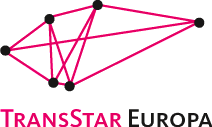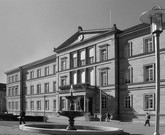
Eberhard Karls University of Tübingen (Faculty of Humanities, Department for Slavic Studies)
The Eberhard Karls University of Tübingen is one of Europe’s oldest universities. Several hundred years of history have been written in the sciences and humanities here.
Tübingen today remains a place of research and teaching. Some 450 professors and more than 4000 other academic staff teach at the university’s seven faculties. The latest chapter in the history of the university is marked by its success in the excellence initiative by the German federal and state governments. One graduate school, one excellence cluster and the university’s institutional strategy were successful in the major funding program, making Tübingen one of Germany’s eleven universities to have been awarded the status of being “excellent”. Tübingen is also home to five collaborative research centers, is involved in six transregional collaborative research centers and hosts five research training groups – all sponsored by the German Research Foundation (DFG). The university specializes in a number of innovative fields of research: neuroscience, clinical imaging, translational immunology and cancer research, microbiology and infection research, molecular biology of plants, environmental and geoscience, astro- and elementary particle physics, quantum physics and nanotechnology, archaeology and anthropology, language and cognition, education and the media. The excellence of research helps create optimal conditions for students from all over the world. Research-oriented learning is a particular strength of Tübingen study programs, thanks to the close links between research and teaching. Teaching at the University of Tübingen reflects the broad, interdisciplinary spectrum of its research. More than 280 courses are on offer. The university is open to the international exchange of academics and students and has partnerships with more than 150 educational institutions in 45 countries, particularly in North America, Asia and Latin America as well as with all the countries in Europe. Some 12.4% of students in Tübingen come from abroad, and many of the university’s German students pursue part of their studies in another country. “International since 1477” – the perfect way to summarize the University of Tübingen.
The Department for Slavic Studies at the University of Tübingen covers Slavic languages, literatures and cultures. The main research activities focus on Western Slavic and Russian studies. Students are able to enrol in Slavic Studies for obtaining a Bachelor degree and for a Master’s degree in Slavic Literatures and Cultural Studies, Slavic Linguistic Studies and German-Polish Transcultural Studies. The department has three chairs held by Prof. Dr. Tilman Berger, Prof. Dr. Schamma Schahadat and Prof. Dr. Irina Wutsdorff.
Some of the most important projects of the last few years are Literatur und Philosophie [Literature and Philosophy], focusing on the interaction between literature and philosophy within Russian literature, Textabdrücke – literarisches Übersetzen [Textual Impressions – Literary Translation], analyzing the links between theory and practice of literary translation and Der polnische Film – eine europäische Filmkultur [Polish Film – An European Film Culture] about Polish film and cinema.
The Department of Slavic Studies actively cooperates with a number of other universities, e.g. in Warsaw, Łódź, Prague and Saint Petersburg. Part of the activities are not only joint research projects, but also student exchange programs for study abroad programs in Poland, the Czech Republic, Bulgaria, Slovenia or Russia.
There are plenty of invited speakers and a great variety of movie-viewing programs offered in different languages every semester. The department has its own student theatre group which stages plays in Russian.
Project Staff:
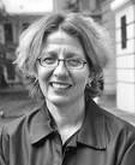 Prof. Dr. Schamma Schahadat
Prof. Dr. Schamma Schahadat
Schamma Schahadat studied Russian and English at the universities of Cologne, Exeter and Moscow; she obtained her Ph.D. and finished her habilitation at the University of Konstanz. Since 2004 she has been a professor for Russian and Polish (specifically modern and contemporary) literatures at the University of Tübingen with an interest in translation studies, cultural theory and semiotics, literary theory, literature and philosophy, gender studies, the interrelation of space and power (e.g. intimacy) and cinema and film theory.
She is the project coordinator of “Textabdrücke” and “TransStar”. Selected publications are:
with Claudia Dathe and Renata Makarska: Zwischentexte. Literarisches Übersetzen in Theorie und Praxis [Intermediary Texts: Literary Translation in Theory and Practice] Berlin 2013; with Konrad Klejsa and Margarete Wach: Der polnische Film von den Anfängen bis zur Gegenwart [Polish Film From its Inception to the Present] Marburg 2012; with Catrin Misselhorn and Irina Wutsdorff, Erkenntnis und Darstellung. Formen der Philosophie und der Literatur [Cognition and Presentation: Forms of Philosophy and of Literature] Paderborn 2011; with Dorothee Kimmich, Kulturen der Leidenschaften – Leidenschaften in den Kulturen [Cultures of Passion – Passion in Cultures] Special edition arcadia, vol. 44 (2009).
Contact: schamma.schahadat@uni-tuebingen.de
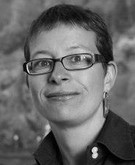 Claudia Dathe
Claudia Dathe
Claudia Dathe completed her studies in Business Administration and Translation Studies (Russian, Polish) in Leipzig, Pjatigorsk (Russia) and Krakow. From 1997 to 2004 she was a lector for the German Academic Exchange Service (DAAD) in Kazakhstan and Ukraine. After returning to Germany, she worked as a freelance translator for the Ukrainian, Russian and Polish languages and conducted tutorials for German and Ukrainian up-and-coming translators. Since 2009 she works at the University of Tübingen within the framework of the “Textabdrücke – Literary Translation” project and currently as the coordinator of the EU-funded project “TransStar”. Her professional and research interests focus on the linkages and asymmetries of East and Central European literary spaces. Claudia Dathe translated into German – amongst others – the following Ukrainian authors: Serhij Zhadan, Olexandr Irwanez, Tanja Maljartschuk and Maria Matios.
Contact: claudia.dathe@uni-tuebingen.de
Graduation from High School in 2012, afterwards she completed an eleven months voluntary service at an orphanage in Ghana. Since 2013 she is studying Slavic Studies and History at Eberhard Karls Universität Tübingen. Since 2014 Economics as a minor subject. She is working as a student assistant at the chair for Slavic Studies since November 2014, as well as at the EU-Project TransStar Europa since 2015.
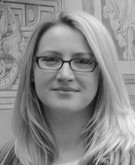 Zinayida Hasich
Zinayida Hasich
She studied German, Roman and Slavic Philology in Luzk (Ukraine) and Tübingen. From 2003 to 2005 she was employed as a German language teacher at the Volhynian Lessja-Ukrainka-University of Luzk. Since 2012 she is enrolled at the Eberhard Karls University of Tübingen, attending the Master program for Slavic Literature and Cultural Sciences. Zinayida Hasich works as project assistant at the Department for Slavic Studies of the University of Tübingen since 2009, at first (2009-2012) as a staff member of “Textabdrücke – Literary Translation”, and now (since January 2013) also for the EU- funded project “TransStar Europe”.
Contact: zinayida.hasich@uni-tuebingen.de
Literaturhaus Stuttgart
Literaturhaus Stuttgart opened in 2001. The protected historic building with historic paternoster and atrium is located across from the convention center Liederhalle in Stuttgart and is part of the newly designed Bosch building complex. Two floors, which also include the former office of Robert Bosch, are used by the Literaturhaus. On the ground floor visitors will find the Literaturhaus tavern called Vinum and a small bookstore.
Regardless of Orhan Pamuk, Sibylle Lewitscharoff or (the Norwegian experimental artist) Terje Dragseth, whether there are 1800 visitors, 180 or 18, regardless of architecture or comic film, of conferences on African literature or late-night discussions with Hanns-Josef Ortheil – Literaturhaus Stuttgart has developed into a lively meeting point of the city. For many evening events individual contributions were commissioned such as for instance “Regarding:” (in cooperation with Stuttgarter Zeitung), “foreign word” (Fremdwort) (in cooperation with SWR) or the German-French series entitled »J’accuse…!« and »carte blanche« (in cooperation with the Institut Français and the Robert Bosch Foundation). The focus is on „Comic & Literature“, the festival of digital literature called „Literature and Energy“ as well as „Literatür“, the German-Turkish night of literature. In addition there are also exhibits which are often accompanied by publications such as the latest „W.G. Sebald – Scattered Reminiscences“ which travelled as far as Brussels.
Literaturhaus Stuttgart organizes writing workshops for students in cooperation with the Robert Bosch Foundation. Young students aged between 14 and 21 visit courses on prose, poetics, journalism, drama, comics, rap and „science and fiction“.
Literaturhaus Stuttgart belongs to the literaturhaus.net network where eleven institutes for literature in Germany, Austria and Switzerland with different partners develop and organize international projects, which include for instance the focus on a country, bilateral city writer projects or poster actions, and also award a common prize.
Project Staff:
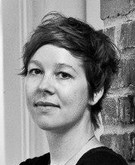 Dr. Stefanie Stegmann
Dr. Stefanie Stegmann
Foto © Klaus Polkowski
PhD, born in Lübbecke. From 1993 to 1998 she studied Art, German Studies and Education Science at Oldenburg’s Carl von Ossietzky University, followed by postgraduate studies in cultural theory with a focus on gender studies. Her PhD she completed with the doctoral thesis: “Got the Look. Science and Her Outfit: A Cultural Theory Study on the Effects of Habitus, Faculty Culture and Sex”, published in 2005. From 2003 to 2005 she worked as a lector for the German Academic Exchange Service (DAAD) in Chernivtsi (Ukraine). In addition to her university work she intermediates and promotes literature. In 2005 she became head of the Literaturbüro Freiburg and since January 2014 she heads the Literaturhaus Stuttgart. She also develops international literature and culture projects with varying teams.
Publications 2012: „Zum Kuckuck. Literarische Umrisse eines Landes“, with Juri Andrukhovytsh, Annette Pehnt, Wilhelm Genazino amongst others; and „Doppelnaht. Fünf Briefwechsel zur deutsch-deutschen Einheit“, with Reinhard Jirgl, Feridun Zaimoglu, Marlene Streeruwitz, Andreas Maier and Kathrin Schmidt amongst others.
Contact: stegmann@literaturhaus-stuttgart.de
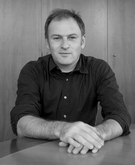 Erwin Krottenthaler
Erwin Krottenthaler
Foto © Yves Noir
Erwin Krottenthaler was born in Zwiesel/Germany in 1969. He holds an academic degree in cultural management and has worked in his current role as Deputy Head at Stuttgart’s House of Literature since 2002. Erwin Krottenthaler has devised projects such as “Unterricht im Dialog – Schreibwerkstätten im Deutschunterricht (Teaching German as Dialogue – Creative writing workshops in the classroom)” (2006-2011). This project has won several awards throughout Germany, including the Preis für Jugendkultur (PwC Foundation award celebrating youth culture) worth €10,000 in 2008. He is also the editor of the multi-volume series of publications “Unterricht im Dialog (Teaching as Dialogue)”, published by Klett/Kallmeyer. Together with José F.A. Oliver, Erwin Krottenthaler just launched an anthology of essays with the title “Literaturmachen – Literatur und ihre Vermittler (Making Literature – Literature and its facilitators”), published by Voland & Quist. On Erwin Krottenthaler’s initiative, the first German Centre for Literature in Education (LPZ-Stuttgart) opened its doors in 2013. For more information, please take a look at: www.lpz-stuttgart.de
Relying on the structure and methodology of classical and postclassical [...]
For further information on translation, the TransStar project and the [...]
Relying on the structure and methodology of classical and postclassical [...]
Sir or Madam, In co-operation with KulturKontakt Austria, the Austrian [...]
Five short films with translations (videopoetry) were made as part [...]
Translating Cube: Six Sides of European Literature and Translation Berlin, [...]
Programme (PDF)
Five short films with translations (videopoetry) were made as part [...]
Translating Cube: Six Sides of European Literature and Translation Berlin, [...]
Programme (PDF)
Translating Cube in Tübingen Reinold Hermanns: SWR2 Journal am Mittag, [...]
Being Exchanged: Between Paris, Stuttgart and Ivano-Frankivsk Yuri Andrukhovytsh, Lubomír [...]
Five short films with translations (videopoetry) were made as part [...]
Bookstore: http://www.edition-fototapeta.eu/geschichten-erzaehlen
More here (PDF). Bookstore: https://knjigarna.ff.uni-lj.si/si/izdelek/1623/pet-poti-do-prevoda/
Five short films with translations (videopoetry) were made as part [...]
Bookstore: http://www.edition-fototapeta.eu/geschichten-erzaehlen
More here (PDF). Bookstore: https://knjigarna.ff.uni-lj.si/si/izdelek/1623/pet-poti-do-prevoda/
Translating Cube: Six Sides of European Literature and Translation Berlin, [...]
Programme (PDF)

